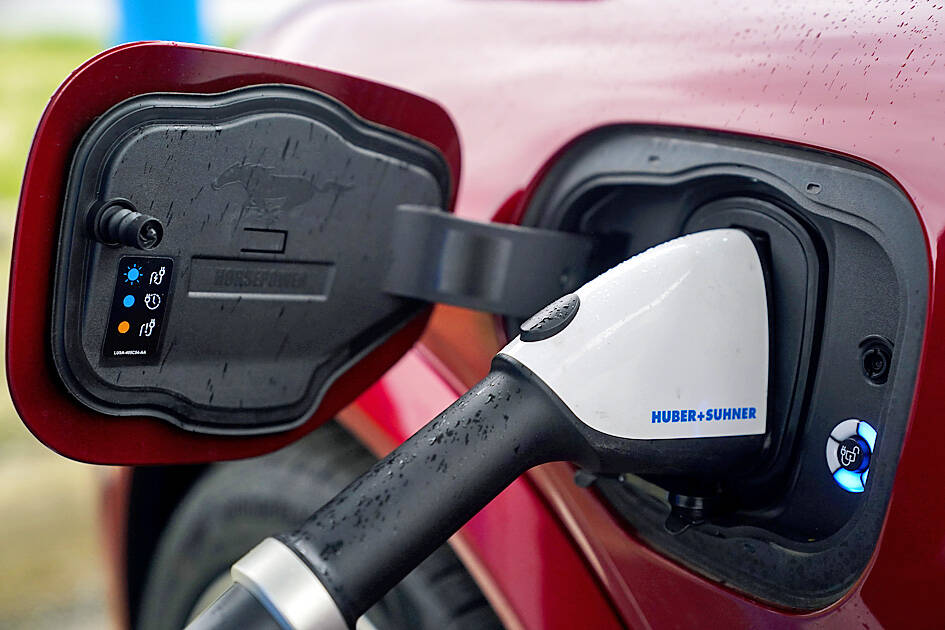The US government gave vehicle manufacturers a reprieve on Friday when finalizing electric vehicle (EV) tax credit rules, by letting vehicles that contain Chinese graphite qualify for the consumer credits through 2026.
The confirmation came as the US Department of the Treasury and Internal Revenue Service published final rules on the clean vehicle provisions under US President Joe Biden’s landmark climate action plan, the Inflation Reduction Act.
Washington has been seeking to reduce its burgeoning EV industry’s reliance on China.

Photo: AP
NEW RULES
Starting this year, new rules came into effect restricting Chinese content in batteries if they were to qualify for EV tax credits of up to US$7,500.
From next year, a qualifying clean vehicle cannot contain critical minerals from businesses controlled by a “foreign entity of concern” such as China, Russia or North Korea.
However, in the final rules, the Biden administration also gave vehicle manufacturers another two years to improve sourcing of materials such as graphite that are considered tough to trace to their origin.
“The final rules being issued today strengthen and secure supply chains and provide certainty for manufacturers and taxpayers,” the department said.
John Bozzella, president of the Alliance for Automotive Innovation, a Washington lobby representing vehicle manufacturers, said the rules “appear to recognize the realities of the global supply chain.”
He said that they provide “temporary flexibility in terms of where the critical minerals in EV batteries can be sourced.”
“That’s helpful as more automotive supply chains and battery production is localized to the US and our allies,” he added.
CRITICISM
However, US House of Representatives Select Committee on the Chinese Communist Party chairman John Moolenaar said that the rule deepens the country’s reliance on China, urging the Biden administration to “reverse course.”
US Senator Joe Manchin, the Democratic chairman of the US Senate Energy and Natural Resources Committee, said that through the new rule, the Biden administration “is effectively endorsing ‘made in China.’”
Despite the tax credits, sales of EVs grew only 3.3 percent to about 270,000 from January through March, far below the 47 percent growth that fueled record sales and a 7.6 percent market share last year. The slowdown, led by Tesla Inc, confirms vehicle manufacturers’ fears that they moved too quickly to pursue EV buyers.
The EV share of total US sales fell to 7.15 percent in the first quarter, according to Motorintelligence.com.

With an approval rating of just two percent, Peruvian President Dina Boluarte might be the world’s most unpopular leader, according to pollsters. Protests greeted her rise to power 29 months ago, and have marked her entire term — joined by assorted scandals, investigations, controversies and a surge in gang violence. The 63-year-old is the target of a dozen probes, including for her alleged failure to declare gifts of luxury jewels and watches, a scandal inevitably dubbed “Rolexgate.” She is also under the microscope for a two-week undeclared absence for nose surgery — which she insists was medical, not cosmetic — and is

GROWING CONCERN: Some senior Trump administration officials opposed the UAE expansion over fears that another TSMC project could jeopardize its US investment Taiwan Semiconductor Manufacturing Co (TSMC, 台積電) is evaluating building an advanced production facility in the United Arab Emirates (UAE) and has discussed the possibility with officials in US President Donald Trump’s administration, people familiar with the matter said, in a potentially major bet on the Middle East that would only come to fruition with Washington’s approval. The company has had multiple meetings in the past few months with US Special Envoy to the Middle East Steve Witkoff and officials from MGX, an influential investment vehicle overseen by the UAE president’s brother, the people said. The conversations are a continuation of talks that

CAUTIOUS RECOVERY: While the manufacturing sector returned to growth amid the US-China trade truce, firms remain wary as uncertainty clouds the outlook, the CIER said The local manufacturing sector returned to expansion last month, as the official purchasing managers’ index (PMI) rose 2.1 points to 51.0, driven by a temporary easing in US-China trade tensions, the Chung-Hua Institution for Economic Research (CIER, 中華經濟研究院) said yesterday. The PMI gauges the health of the manufacturing industry, with readings above 50 indicating expansion and those below 50 signaling contraction. “Firms are not as pessimistic as they were in April, but they remain far from optimistic,” CIER president Lien Hsien-ming (連賢明) said at a news conference. The full impact of US tariff decisions is unlikely to become clear until later this month

Nintendo Co hopes to match the runaway success of the Switch when its leveled-up new console hits shelves on Thursday, with strong early sales expected despite the gadget’s high price. Featuring a bigger screen and more processing power, the Switch 2 is an upgrade to its predecessor, which has sold 152 million units since launching in 2017 — making it the third-best-selling video game console of all time. However, despite buzz among fans and robust demand for pre-orders, headwinds for Nintendo include uncertainty over US trade tariffs and whether enough people are willing to shell out. The Switch 2 “is priced relatively high”